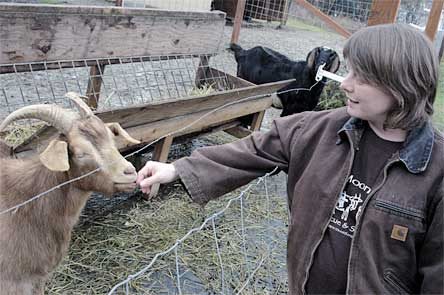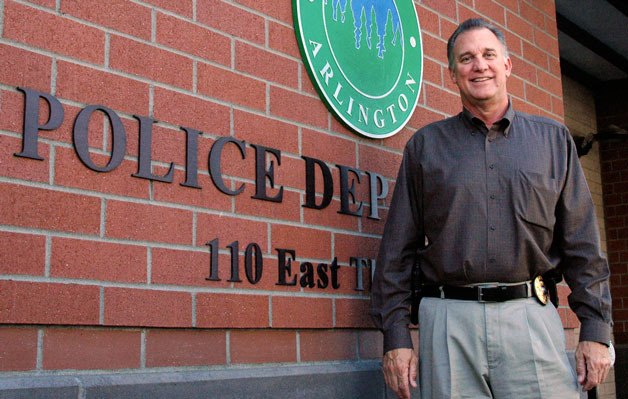ARLINGTON — From Romeo to Ziggy, Mom to Dad, all goats at New Moon Farm in Arlington have tales to tell.
But since they can’t speak, it’s up to farm owner and operator Ellen Felsenthal to be their voice.
“If they’re loved and cared for, they thrive,” Felsenthal said. “Everyone here has a story. No matter what the situation was that they came from, they deserve a second chance.”
Felsenthal runs New Moon — a goat rescue organization — on her six-acre piece of property located on Burn Road. There, she and a small group of volunteers help abandoned, neglected or injured goats find new homes.
As far as Felsenthal knows, it’s only one of three rescue organizations available for goats in Washington state.
Sometimes the goats come from area animal control agencies. Other times they come directly from owners.
No matter where the goats come from, Felsenthal provides them with the care they need to get back on their feet.
“Some have had a great life, while others need a lot of rehab,” Felsenthal said. “Goats come and go constantly.”
Arrival at New Moon
Once a goat arrives at Felsenthal’s farm, they go through a series of medical checks to find out whether the animal has any major health defects or issues.
They are then quarantined in a separate section of the property to ensure healthy and adoptable goats do not contract any diseases that recently collected goats may have.
Once they “pass inspection,” the goats reside in a pen with other rescue goats available for adoption.
Felsenthal said she currently has 38 goats and two sheep looking for homes. Seven more goats were scheduled to be dropped off at New Moon on Feb. 20-21.
Typically the goats do not stay too long. So far in 2010, 19 goats have come in and 16 have been adopted, she said.
“Between five to seven goats come and go each weekend,” Felsenthal said.
Goats at New Moon are not available for landowners interested in simply clearing brush from their property or for food. Rather, goats Felsenthal adopts out are pets primarily.
“But if they’re used to help eat grass too, that’s no big deal,” she said.
Finding new homes
Before Felsenthal adopts out any of her goats, she does an informal inspection at the would-be owners’ home to make sure that they have appropriate fencing and shelter for the animals.
Since goats can be escape artists, she said owners should have durable and sturdy fences to ensure they don’t escape their new home before they have settled in.
She also checks for toxic plants in a new owners’ yard or area. Some plants, such as rhododendrons, are toxic to goats, and must be removed before a goat takes up residence in a new environment.
After that initial inspection, goat adopters must pay a fee of between $75-$100 — and reimburse Felsenthal for gas if the animal is delivered — in order to complete the transaction.
“Some people come out and they’re looking for a certain type of goat, while others go home with more than one sometimes,” she said. “I encourage people to come out and see what kind of goat they bond with and go from there.”
Tenth anniversary of Ziggy
Felsenthal originally started rescuing goats in 1999 with the arrival of Ziggy, a permanent resident of her farm.
She said she had been involved in horse, dog and cat rescue organizations in the past. Shortly after Ziggy joining her family, she began to target other goats for adoption, and in 2003 when she moved to Arlington, she officially founded her formal rescue organization.
Since then, Felsenthal has become accredited by the state as a non-profit organization. She’s currently waiting to hear back whether New Moon will be accepted as a federal nonprofit.
“Right now I receive about 25 percent to 30 percent of my budget from adoption fees and donations,” she said.
The rest comes from her own pocket.
Goats ahoy
Felsenthal practices what she preaches.
In addition to caring for between 30-40 adoptable goats, she has a permanent herd of 11 goats, two sheep and two horses.
All of her animals are rescues, which are kept separate from her goats available for adoption.
Many of Felsenthal’s animals have serious medical issues or were not able to be adopted, so they would up staying at New Moon.
Felsenthal will be offering a “Goats 101” basic goat care class this spring. During the half-day class, new owners will be able to learn about goat ownership.
For more information about New Moon, the classes or to donate, visit www.newmoonfarm.org.







